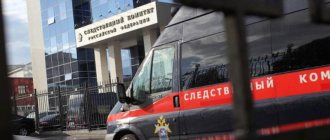MEASURES OF PROCEDURAL COERCION, means of influence provided for by law, used to ensure proper behavior of participants in criminal proceedings. M. p. p. limit the constitutional rights of citizens, therefore they are permissible only if there are grounds established by law. From other government measures. coercion of legal acts are distinguished by the fact that they are applied only in an instituted criminal case and are of a procedural nature; are applied by authorized bodies (investigative bodies, court) to a suspect, accused or other persons when their inappropriate behavior or the possibility of such behavior creates or may create obstacles to criminal proceedings.
Measures of procedural coercion in Russia
They are divided into 3 groups: detention of a suspect, preventive measures, and other coercive measures. Detention of a suspect is a short-term deprivation of liberty of a person suspected of committing a crime in order to suppress his criminal activities, prevent concealment from the investigation and trial, falsification and concealment of evidence, as well as other actions that may interfere with the establishment of the circumstances of the case. The maximum period of detention is 48 hours; a judge can extend it by no more than 72 hours. Detention on suspicion of committing a crime, for which a sentence of imprisonment may be imposed, is carried out if one of the following grounds exists: when a person is caught committing a crime or immediately after its commission; when victims or eyewitnesses point to him as having committed a crime; when obvious traces of a crime are found on him or his clothes, on him or in his home. If there is other information giving grounds to suspect a person of committing a crime, he may be detained if he tried to escape, or does not have a permanent place of residence, or his identity has not been established, or if the investigative authorities sent a petition to the court to impose a measure against the said person suppression in the form of detention.
The following cannot be detained: the President of the Russian Federation (Article 91 of the Constitution of the Russian Federation), the head of a representative office or a member of a diplomatic mission. personnel of the mission (Article 29 of the Vienna Convention on Diplomatic Relations, 1961), consular officials, except in cases of prosecution for committing a serious crime (Article 25 of the Regulations on Diplomatic and Consular Missions of Foreign States on the Territory of the USSR, 1966). With the exception of cases of arrest at the scene of a crime, members of the Federation Council and State Deputy are not subject to arrest. Duma, federal court judge, magistrate, prosecutor, chairman of the Accounts Chamber of the Russian Federation, his deputy and auditor of the Accounts Chamber of the Russian Federation, Commissioner for Human Rights in the Russian Federation, President of the Russian Federation, who has ceased to exercise his powers.
Preventive measures are criminal procedural means of influence used within the framework of criminal proceedings in order to ensure proper behavior and prevent possible violations on the part of the accused or suspect. Preventive measures may be chosen if there are sufficient grounds to believe that the accused or suspect: will hide from the inquiry, will preemptively investigation or trial; may continue to engage in criminal activity; may threaten a witness, other participants in criminal proceedings, destroy evidence, or otherwise obstruct the proceedings in a criminal case; as well as to ensure the execution of a sentence or the possible extradition of a person to a foreigner. to the state. Only one of the preventive measures is applied to the accused or suspect; it can be changed during the course of the criminal case.
Preventive measures are: recognizance not to leave; personal guarantee; observation by the command of a military unit; supervision of a minor accused; pledge; House arrest; detention.
The undertaking not to leave the place and proper behavior consists of letters. obligation of the suspect or accused: not to leave the permanent or temporary place of residence without the permission of the inquiry officer, investigator or court; to appear at the appointed time when summoned by the inquirer, investigator and to court; not otherwise interfere with the criminal proceedings.
Personal guarantee consists of letters. the obligation of a trustworthy person that he guarantees that the suspect or accused fulfills his obligations to appear at the appointed time when summoned by the inquirer, investigator and to the court and in other ways not to interfere with the proceedings in the criminal case.
Observation by the command of a military unit of a suspect or accused who is a serviceman or a citizen undergoing military service. fees consists of taking measures provided for by the charters of the Armed Forces. Forces of the Russian Federation, in order to ensure that this person fulfills his obligations to appear at the appointed time when summoned by the inquirer, investigator and to court and in other ways not to interfere with the proceedings in the criminal case. The election of surveillance by the command of a military unit as a preventive measure is permitted only with the consent of the suspect or accused.
Supervision of a minor suspect or accused consists of ensuring his proper behavior by parents, guardians, trustees or other trustworthy persons, as well as specialist officials. the children's institution in which he is located, about which these persons give letters. obligation.
Bail consists of posting by the suspect or accused or other individual. or legal person to the deposit account of the body that chose this measure, money, securities or valuables in order to ensure the appearance of the suspect or accused before the investigator, interrogating officer or in court and to prevent him from committing new crimes. The type and amount of bail are determined by the court, taking into account the nature of the crime committed, information about the identity of the suspect, accused and the property status of the bailor.
House arrest consists of keeping a suspect accused of complete or partial isolation from society in a residential building with the imposition of restrictions and/or prohibitions (may relate to leaving the residential premises, communicating with certain persons, sending and receiving postal and telegraphic items, using communication means and the Internet) and control over it.
Detention as a preventive measure is applied by a court decision in relation to a suspect or accused of committing crimes for which the criminal law provides for punishment in the form of imprisonment for a term of St. 2 years, if it is impossible to apply another, milder measure. When choosing a preventive measure in the form of detention, the judge's decision must indicate specific, factual information. the circumstances on the basis of which the judge made such a decision. Such circumstances cannot include data that was not verified during the court hearing, in particular the results of operational investigative activities obtained in violation of the requirements of the criminal procedure law. B will exclude. In cases, this preventive measure may be chosen in relation to a suspect or accused of committing a crime, for which a penalty of imprisonment for up to 2 years is provided, in the presence of one of the following circumstances: the suspect or accused does not have a permanent place of residence in the territory of the Russian Federation; his identity has not been established; he violated a previously chosen preventive measure; he hid from the authorities. investigation or from the court. For a minor suspect or accused, detention as a preventive measure may be applied if he is suspected or accused of committing a grave or especially grave crime (in exceptional cases - of committing a crime of average gravity).
Other coercive measures are measures applied to any participants in the process in order to ensure the established procedure for criminal proceedings, as well as the proper execution of the sentence. The law includes other legal clauses: obligation to appear, drive, temporary. removal from office, seizure of property, seizure of securities, monetary penalty.
Of the other legal clauses, time is applied only to the suspect or accused. removal from office, seizure of property; against the witness, victim and other participants – a monetary penalty; to the suspect, accused, victim and other participants in the process - an obligation to appear, a summons. For temporary removal from office, seizure of property, monetary penalty requires a court decision, for an obligation to appear and arrest - a decision of the inquirer or investigator.
Measures of procedural coercion in foreign countries
They are interim measures and are subject to strict regulation. In the law of most European countries. countries there is no clear distinction between preventive measures and other legal provisions. For example, in English law there is no distinction between police arrest (detention) and preliminary detention. detention. However, almost all legal provisions affecting the most essential rights of citizens are carried out under judicial control. Police arrest (detention) is a short-term measure. Its initial duration should not exceed 24 hours. But in cases of “serious arrest crimes” (murder, rape, etc.), the senior police official has the right to extend the arrest to 36 hours. Further extension is allowed only by court decision - initially up to 72, and then again - up to 96 hours. This is the maximum period of police arrest, before the end of which the police must formulate charges or release the detainee. At the preliminary stage. investigation, the most common measure is arrest. This is a long-term measure (from 70 to 112 days), which is carried out on the basis of a court order. In English law, the institutions of bail and surety are known. The guarantors, having taken upon themselves the obligation to appear for the accused upon the first request of the court, guarantee its fulfillment with a certain amount payable in case of violation of the obligation.
In Germany, law enforcement agencies ensure the investigation, consideration of a criminal case by a court, and the execution of a sentence. Preventive measures are not specifically identified among these measures. Accordingly, the line between detention and detention is not always clearly drawn. The use of criminal procedural coercive measures means an invasion of the rights of citizens protected by the constitution, therefore only a judge has the right to decide the admissibility and duration of an arrest. The detainee must be brought before a judge for questioning no later than the next day. If the judge considers the detention unjustified or believes that the grounds for the detention have disappeared, then he orders the release of the detainee, otherwise at the request of the prosecutor or on his own. initiative issues an arrest order. Arrest is not applied when it is disproportionate to the significance of the case or the expected punishment. The arrest can be replaced by: the imposition of an obligation to appear when summoned to court or criminal prosecution authorities, and not to leave the place of residence without their permission; the ability to leave your place of residence only under the supervision of certain persons; prohibition of maintaining contact with other accused, witnesses, experts. The appearance of the accused may be ensured by posting bail or surety. The law provides for and others will force. measures, e.g. time deprivation of driver's license, temporary ban on profession.
In US legislation, the terms “preventive measures” and “M. p.p." are not used. According to the rules of criminal procedure, persons who fall within its scope are subject to the issuance of a warrant for the arrest of a person in respect of whom there are reasonable grounds to believe that he has committed a crime. Instead of a warrant, at the request of the prosecutor (attorney), a summons to appear in court may be issued. Bail or release from custody on personal recognizance is used in cases where the accused or the crime committed by him does not represent a large society. dangers; when guarantees are provided that the accused will not abscond from the investigation, and when there is no likelihood of continuing criminal activity or opposing the investigation and trial.
Article 111 of the Code of Criminal Procedure of the Russian Federation. Grounds for applying other measures of procedural coercion (current version)
1. The general conditions for the application of procedural coercive measures are: 1) the existence of an instituted criminal case; 2) the proper subject of application (held in the appropriate position, who accepted the case for his proceedings, not subject to recusal) and 3) the proper object (persons who are subject to the criminal procedure law, their lack of official immunity). Other measures of procedural coercion, as a rule, should not be applied before the initiation of a case, after its termination and after its suspension (see commentary to Article 97).
2. The commented article classifies other measures of procedural coercion into two groups: a) applied to the accused and suspect (Part 1 of Article 111); b) applied to the victim, witness, civil plaintiff, civil defendant, expert, specialist, translator and (or) attesting witness (Part 2 of Article 111). It should be borne in mind that the list of participants in the process is not exhaustive. It is supplemented by guarantors, persons who have taken charge of the minor accused (suspect), and a juror. See comment. to Art. 117. For the seizure of property (Articles 115 - 116), this division is conditional. The property of not only the accused and the suspect, but also of other civil defendants may be seized. See comment. to Art. Art. 54, 115.
2. Other measures of procedural coercion are usually classified according to the grounds and purposes of their use:
1) measures of subsequent coercion are a consequence of violation of procedural norms - the procedural responsibility of the violator. The basis for their use is a criminal procedural offense. Additionally, according to the purposes of application, subsequent coercion is divided into punitive (the goal is to impose responsibility on the perpetrator) and restorative or protective measures (the goal is not so much to assign responsibility as to restore the broken rule of law). Punitive measures of procedural coercion include only two: the imposition of a monetary penalty in cases of failure by participants in legal proceedings to fulfill procedural duties, as well as their violation of order at a court hearing (Articles 117 - 118); conversion to the state's income of a pledge placed as a preventive measure (clause 4 of article 106). Restorative measures are arrest (Article 113), overcoming resistance during a search, examination, etc.;
2) preventive coercion is associated with the prevention of possible future violations of the procedural order. Such coercion is applied without the guilt of the obligated persons and is called preventive-enforcement. The basis for its application is a reasonable assumption of a possible procedural violation. This group includes the obligation to appear (Article 112), seizure of property (Article 115), temporary removal from office (Article 114), and placement of the accused in a medical hospital for a forensic examination (Article 203). “Potential” coercion during investigative actions also has a security nature.
Comment source:
Ed. A.V. Smirnova “COMMENTARY ON THE CRIMINAL PROCEDURE CODE OF THE RUSSIAN FEDERATION” (ARTICLE BY ARTICLE), 5th edition
SMIRNOV A.V., KALINOVSKY K.B., 2009



